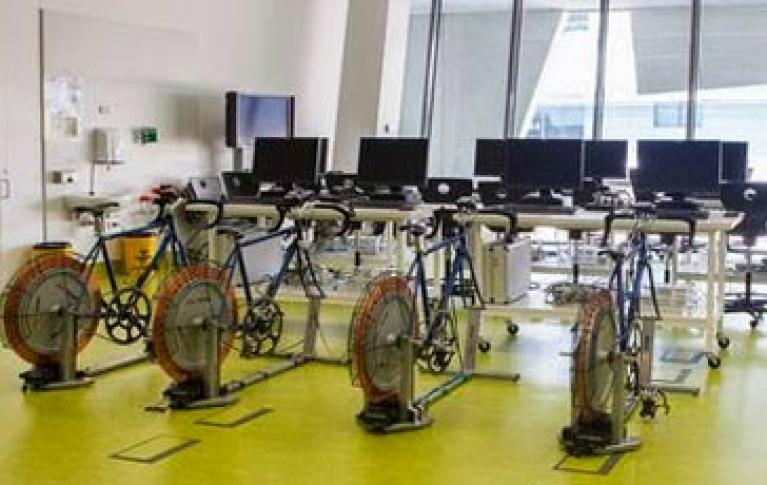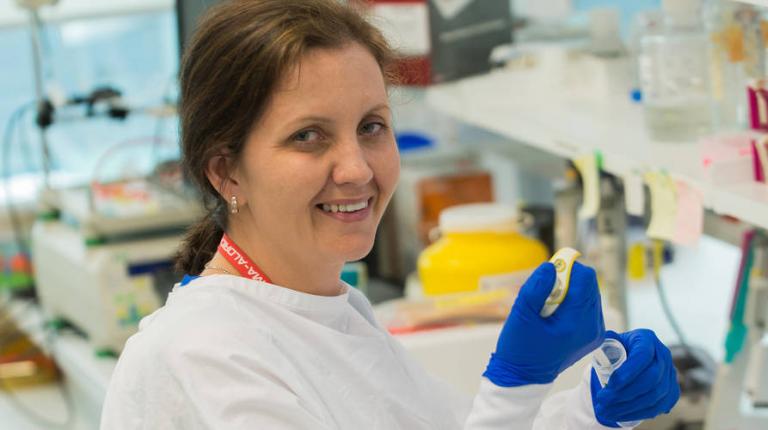Overview
Be part of a growing demand for graduates with training in the field of exercise and biomedical sciences. Victoria University's Bachelor of Science in Biomedical and Exercise Science is a dual disciplinary degree.
It integrates biomedical science and exercise science into a compelling new area of study in the environments of physical activity, sport, and health research. This includes:
- the fundamentals of anatomy and physiology, pathophysiology
- biochemistry, biomechanics and kinesiology
- psychology
- how the structure and function of the body is influenced by exercise
- how it is impacted by disease.
You will learn to apply theoretical knowledge and analytical techniques to a range of practical and clinical scenarios including learning in industry, workplace and community settings. You will also gain experience and develop a solid foundation in designing research methodologies, and performing analytical research by participating in active research as a team member.
Victoria University is equipped with new medical research facilities at Sunshine Hospital, and exercise and sport science facilities at our Footscray Park campus.
The course is closely linked with:
- The University’s Institute for Health and Sport (IHES)
- Collaborative Research Network in partnership with the University of Melbourne and the Australian Institute of Musculoskeletal Science (AIMSS).
This course provides a framework for the acquisition of further specialist knowledge and skills, enabling graduates to successfully enter professional settings within the health sector, including industry and research or pursue post-graduate studies in allied health courses.
Study overseas while earning course credits
At VU you can spend part of your degree studying overseas all while gaining credits towards your course.
Immerse yourself in a new culture and learn from a new perspective, while building experiences that will help you to stand out in the competitive job market.

Careers in biomedical and exercise science
The Bachelor of Biomedical and Exercise Science course provides a platform for a pathway to pursue further specialist knowledge and skills.
Graduates successfully enter professional settings within the medical, public health and sporting sectors, including government, industry and research sectors, or pursue post-graduate studies in allied health courses.
Graduate of the Bachelor of Biomedical and Exercise Science:
- may undertake further study in the fields of clinical exercise science, sports science, biomedical science, dietetics, education or other doctoral studies.
- will be equipped for exercise and health research
- often choose to work in scientific, research or sporting science organisations.
Course structure
To attain the Bachelor of Biomedical and Exercise Science students will be required to complete 288 credit points consisting of:
- 96 credit points of First Year Core studies;
- 192 credit points of remaining Core studies.
Course structure and units
First Year Core Units
-
- Unit code
- AHE1202
- Credits
- 12
-
- Unit code
- RBM1100
- Credits
- 12
-
- Unit code
- RBM1200
- Credits
- 12
-
- Unit code
- RBM1518
- Credits
- 12
-
- Unit code
- RBM1528
- Credits
- 12
-
- Unit code
- RCS1601
- Credits
- 12
-
- Unit code
- RCS1602
- Credits
- 12
-
- Unit code
- SCL1003
- Credits
- 12
Year 2, Semester 1
-
- Unit code
- AHE2006
- Credits
- 12
-
- Unit code
- RBM2100
- Credits
- 12
-
- Unit code
- RBM2530
- Credits
- 12
-
- Unit code
- RBM2560
- Credits
- 12
Year 2, Semester 2
-
- Unit code
- AHE2102
- Credits
- 12
-
- Unit code
- AHE2127
- Credits
- 12
-
- Unit code
- RBM2540
- Credits
- 12
-
- Unit code
- RBM2800
- Credits
- 12
Year 3, Semester 1
-
- Unit code
- AHE3100
- Credits
- 12
-
- Unit code
- HBM3101
- Credits
- 12
-
- Unit code
- HBM3104
- Credits
- 12
-
- Unit code
- RBM3264
- Credits
- 12
Year 3, Semester 2
-
- Unit code
- AHE3126
- Credits
- 12
-
- Unit code
- HBM3105
- Credits
- 12
-
- Unit code
- RBM3265
- Credits
- 12
-
- Unit code
- SCL3003
- Credits
- 12
Achieve more with the VU Block Model
We are the first Australian university to use a 'block' model of learning, where you study one unit at a time rather than juggling several at once.
Introduced in 2018, the VU Block Model has improved our student results and achievements, and has won awards for innovation and excellence. Initially for first-year students, it now applies to all students studying at our Melbourne campuses.
You'll study in short bursts, called blocks, of three 2-3 hour face-to-face teaching sessions per week.
Each block focuses on one unit (subject) and is only four weeks long, with up to four days between. Our two semesters have four blocks each, and there are optional blocks over winter and summer where you can catch up on a missed unit.
Some courses have labs and pracs too, and these are generally scheduled on the same days as teaching sessions. There are also workshops where you'll develop your study skills and prepare for your future career.
Find out more about the VU Block Model.
Learning outcomes
On successful completion of this course, students will be able to:
| 1. | Apply a broad and coherent knowledge of the fundamentals of anatomy, physiology, kinesiology, biomechanics, psychology to investigate health and disease, nutrition and exercise science; | ||
| 2. | Apply theoretical knowledge to practical situations in laboratory simulated learning environments, and community and industry settings, independently and as part of a research team; | ||
| 3. | Critically review the principles of scientific research, experiment design and project design and consider social, cultural, and environmental issues; | ||
| 4. | Critically analyse and synthesise biomedical and exercise science literature and data; | ||
| 5. | Elucidate written and oral knowledge to a range of associates including supervisors, peers, research teams; community and industry partners; | ||
| 6. | Reflect on own learning and career goals and the development of strategies for achieving them. |
What's a unit?
A unit or 'subject' is the actual class you'll attend in the process of completing a course.
Most courses have a mixture of compulsory 'core' units that you need to take and optional elective units that you can choose to take based on your area of interest, expertise or experience.
Credits
Each unit is worth a set amount of study credits based on the amount of time you study. Generally, 1 credit is equal to 1 hour of study per week.
Admissions
Victoria University is committed to providing a transparent admissions process. Find out more about how to apply for our courses, and our commitment to admissions transparency.
Applicants for this course will need to have met the academic requirements and prerequisites for this course outlined below.
Meeting the minimum admission criteria does not guarantee entry into this course. Past academic performance may be considered.
Entry requirements
Completion of an Australian Senior Secondary Certificate (VCE or equivalent) including Units 3 and 4: a study score of at least 25 in English (EAL) or 20 in any other English (or equivalent).
AND:
A study score of at least 20 in two of the following: Biology, Chemistry, Health & Human Development, any Mathematics or Physical Education.
OR:
Completion of an Australian Advanced Diploma or Diploma (or equivalent).
PLUS:
IELTS (or equivalent): Overall score or 6.0 (with no band less than 6.0 in Listening, Reading, Writing and Speaking).
OR:
Completion of a Foundation course or equivalent.
Find out if you meet the entry requirements, including English language and academic requirements.
Pathways & credits
There are many ways you can start your education journey at VU. Pathways offer an easy transition between courses at different levels, so that you can start with a certificate and progress right through to postgraduate study.
Pathways from VU courses
If you have completed any of the following course(s), you will be guaranteed a place in this course. In some cases you may receive credit for your previous study, reducing the time it takes to complete your course.
You will be guaranteed entry only.
You will be guaranteed entry only.
Find out more about pathways and credits.
Credit for skills and past study
Use our credit calculator to find out how much credit you could get towards your course, based on your previous study.
If you have completed study with another university or institution and believe you are eligible to receive credit for skills and past study, you can apply for advanced standing.
Applications for advanced standing can be made after a discussion with your course chair or academic adviser.
How to apply
We are currently accepting international applications, and we welcome you to apply for this course.
Click 'apply' to begin, and we will guide you through the application process.
If you have questions, please get in touch:
- Phone: +61 3 9919 1164
- Online: enquiry form
Information and fees listed above are for non-resident students. Fees are accurate at the time of viewing and will be subject to annual increases. Some courses require students to purchase equipment or clothing that they will need in the course. These equipment or clothing costs are not included in the course fees listed above – check your Letter of Offer for an estimate on non-tuition-fee-related expenses.
VU takes care to ensure the accuracy of this course information, but reserves the right to change or withdraw courses offered at any time. Please check that course information is current with the Student Contact Centre.



